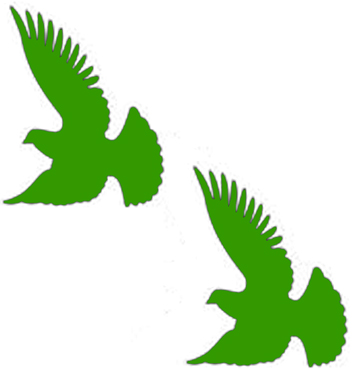Q: I've seen untrained young birds turn into stars at two years old. I also watch the futurities and the continual training of young birds each and every day. While the "cream" may rise to the top, how about the "sickening factor" on those that may otherwise develop at a later date but are lost before they ever get the chance to prove themselves. Aren't we as fanciers throwing many away? What strain would you recommend that can withstand this YB punishment?
First of all, flying young birds does not have to be, or maybe I should say, should not be, an inhumane torturing system. My young bird team is always well fed, never trained to great distances -- in other words, not abused. I do not lose many birds training or racing during the young bird season. And for the most part, my good young birds also turn out to be my good old birds.
Losses in the young bird training/racing are almost always attributed to mistakes and abuse by the fancier. The number one problem is, people train young birds before they are ready. "Ready" means a pigeon that is in perfect health. And "training" means a healthy robust happy young bird coming home, not struggling home in adverse conditions or when starved.
A starved young bird, should it make a mistake, will not have the energy level to overcome its mistake and come home. Starving is a method used by inhumane desperate people, not by people who love their birds and see them as a living creature that we have chosen to care for and develop, physically and mentally.
The practice of starving a bird is totally inexcusable and barbaric to me. I equate this to a human's lack of food as a prisoner in some third world country or my father's situation as a prisoner of war in Russia. Fanciers using starvation as a supposed method remove the finesse of flying a pigeon for its love for home. They substitute hunger, or should I say survival, as all the bird can think about. It's not a very flattering way to treat an animal we want to coach and develop and interact with. Truly a shameful state of affairs for any hobbyist to practice.
I guess the big problem is that we as Americans have not experienced true hunger. I'm afraid that I did when I was a young boy during World War II -- and not only hunger, but malnutrition. I therefore could never do that to a living thing, especially one that is in my power. It is beyond me how a fancier can be proud of starving or abusing his team of birds -- and then perhaps even go to church on Sundays and act righteous, for he is committing a sin against life that no religion can approve of.
Another problem with training young birds is if they have a respiratory problem or canker. This is not only a physical handicap, but even more so, a great disadvantage when a bird tries to orientate when released. When birds do not orientate, but circle and flounder when liberated, it is almost always a respiratory or canker problem, not a problem of lack of intelligence. Canker manifests itself or shows very similar signs as respiratory problems.
The other main mistake fanciers make here in the Midwest at least is that the beginning of the training season for young birds also coincides with the heat and humidity of summer. Should the birds be liberated too late in the morning and make a mistake, getting caught in a hot humid day will be not only detrimental, but quite often will damage them where they are not physically capable of performing in the future. But then again, this is usually a mistake by the fancier, or should I say, the coach of the team.
Perhaps you should go to my web page and read the article that Roy Dyck wrote about my loft years ago concerning young bird flying. Your question or comment about maturing birds -- there is certainly nothing wrong with breeding some summer youngsters off the best proven pigeons and letting them enjoy life for a year before you fly them as old birds.
As to what birds do best for young bird flying, I would say any good middle distance pigeon. Meulemans are my favorites, since they can handle the somewhat harder conditions that so often prevail here in the Midwest. They still have the speed that is so necessary in today's young bird racing. And they handle heat and humidity very well for me. But like I said, you need a good middle distance bird, not necessarily a strain.
